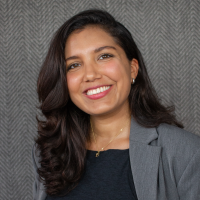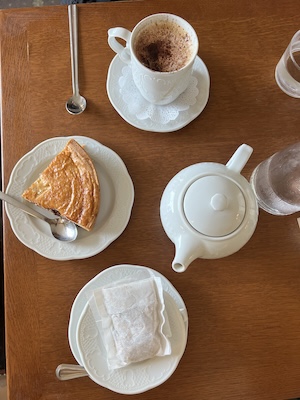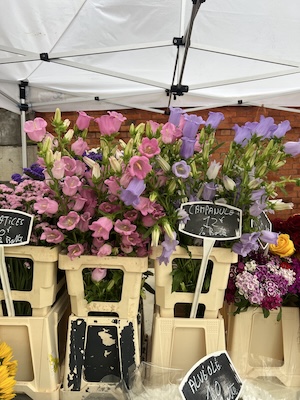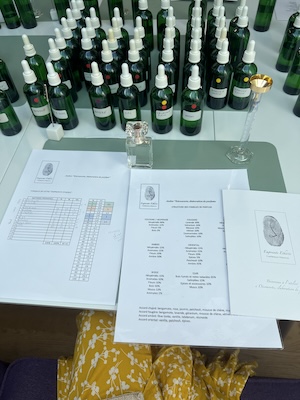6 Tips for Learning a Language While Studying Abroad
-
Written by Paola Roldan - IMBA Student - United States

- IMBA Student Blog
Discover my practical tips for learning a language while studying abroad. From language exchange programs to using AI tools like ChatGPT, find out how to master French or any language and fully immerse yourself in local culture.
Before moving to France, studying abroad was something I had always wanted to experience. I did not study abroad during my undergraduate studies, and I would often think back to my time at university and wonder what it would have been like to join my friends who went to Madrid, Beijing, or Prague for a semester. When I decided to continue my education in my late twenties and pursue an MBA, I knew that I wanted to do it in a country other than my own.
This month marks one year since I arrived in France to pursue my MBA at the International School of Management, and I have had a whirlwind of beautiful experiences as I complete my studies. After nearly a year of living in a new country for the first time, I have learned so much — both in and out of textbooks.
One of the most important things I’ve navigated throughout my year here is the French language. Moving to a new country is never easy, but learning the local language (and even a bit of the lesser-spoken local dialects, as I’ll touch on later) is, in my opinion, crucial to fully experiencing your studies abroad. By learning French, I’ve been able to experience France and its people at a more profound level than I otherwise would have. Below, I’ll share some of the best practical ways — from my experience — to learn a language while studying abroad.
Language Exchange Partner
 When studying abroad, you won’t be the only person wanting to learn a new language. Someone local might want to learn your native language (or a language you speak well), too! This was the case for me and Adrien, a French local with whom I started weekly language exchange coffee sessions.
When studying abroad, you won’t be the only person wanting to learn a new language. Someone local might want to learn your native language (or a language you speak well), too! This was the case for me and Adrien, a French local with whom I started weekly language exchange coffee sessions.
So far, we’ve had a few meetups and experimented with the structure to see what works best. Most language exchange meetups function by speaking one language during the first half and switching to the other language during the second half. What works best for Adrien and me is that he speaks English for the entire conversation, and I respond in French.
This has worked well for us, as it allows each person to speak the entire time in their target language. Of course, it will depend on each person’s confidence in their target language, but the great thing about language exchange meetups is that you can adjust the structure however you and your partner like.
To find a language exchange meetup group, check Facebook or Meetup.com.
Chatting with Local Shop Owners
 One of my favorite things about moving to the French Basque country has been getting to know all the local shop owners. After nearly a year of living here, I’ve had many conversations with everyone from the butcher to the baker to the florist, as well as all the clerks at the produce stand and the corner grocery store.
One of my favorite things about moving to the French Basque country has been getting to know all the local shop owners. After nearly a year of living here, I’ve had many conversations with everyone from the butcher to the baker to the florist, as well as all the clerks at the produce stand and the corner grocery store.
At the beginning, I was extremely nervous to talk to the clerks and order meat or bread or tomatoes. However, over time, I got to know the names of everything I usually buy. I made a list in my head of the number of grams of chicken I needed or how many stems of flowers I was getting. Eventually, I repeated these things so many times that I became very comfortable ordering at all my local shops.
Pretty soon, I felt at ease doing my errands, and before I knew it, I was having short exchanges with the clerks. Each time I went into a shop, I would linger for a minute or two longer, learning their names, where they came from, and little tidbits about their lives. My French is not, and still isn’t, perfect, but by warming up to the people in the shops I visit almost every day, it became much easier and more comfortable to try a new word or even learn one or two from them.
Recently, while buying my fruits and vegetables, I asked for some thyme, which I pronounced “teem.” It was a total guess — and a wrong one at that — as the clerk giggled and corrected my pronunciation. Interactions like these are what make French words stick in your brain. I could have read a vocabulary list of herbs fifty times over, but the word for “thyme” wouldn’t have stuck in my head as easily as it did through my interaction at the produce market. Now, I’ll never forget the correct pronunciation.
By chatting with locals you see often, not only do you break down barriers in your target language, but you also learn about local dialects. Through speaking with local store clerks, I’ve learned several useful Basque words, such as hello, goodbye, and thank you. Making an effort to learn even a few words in the local dialect can further your progress in your target language and show locals that you’re making an effort to integrate into the culture.
Volunteering
Volunteering at local charities and events is another great way to pick up the local language. What I love about volunteering is that not only are you able to pick up new words and practice what you already know, but you’re also serving the new community you’re living in.
This was the case for the beach cleanups I’ve done since arriving in Biarritz. It’s wonderful knowing that there’s a synergy between the service I’m providing for the community and the language learning that the community is providing for me.
Plus, people are generally happy to receive volunteers, so regardless of your language proficiency, the charity or organization will most likely be grateful for the help. It’s a win-win situation!
As I continue my time here, I’d like to find more opportunities to volunteer, such as at a nearby elderly home, to give back to the community while improving my French.
ChatGPT
It’s no surprise that Artificial Intelligence has swept into all aspects of our lives, from everyday tasks to the business world. But did you know that you can use it to aid your language learning, too?
For years, tools like Google Translate — and even more advanced translation tools like DeepL — have provided awkward-sounding translations or sometimes just straight-up incorrect suggestions.
I’ve found that AI tools like ChatGPT or Google Gemini are the best for finding what you want to say because they allow you to preface your questions with prompts.
For example, I’ve asked things like “Translate the following sentence into informal, colloquial French,” so I don’t sound like a robot when talking to someone my age. A lot of the time, traditional translation tools are limited in this capacity. But with AI tools, I can ask for highly specific translations or even ask for an expansion on ideas, such as “Provide several options on how to say the following in informal, everyday French.”
Having the ChatGPT app on my phone has been a game-changer for sounding more natural in my everyday life.
Group Chats
Speaking of everyday life, my next tip for learning a language while studying abroad is to join group chats that are primarily run in your target language. When I first arrived in France, I started a membership at a coworking space in town where I would go during the day to work and study. I was added to a WhatsApp group chat that included all the members, nearly all of whom are French.
Needless to say, all updates and conversations were in French — but not just any French — everyday, colloquial French. I quickly realized I had an advantage in getting to know the everyday language that locals spoke. I was able to observe the way people wrote, how they abbreviated things, or eliminated whole words altogether. Within the first few weeks, I had already learned so much about colloquial French and was able to naturally incorporate it into my messages.
Take Courses
 Learning a skill in your target language is another great way to pick up vocabulary. Whether it’s signing up for a gym class, registering for a surf lesson, or taking an art class, you’ll likely pick up new words if you hear them in conjunction with the action.
Learning a skill in your target language is another great way to pick up vocabulary. Whether it’s signing up for a gym class, registering for a surf lesson, or taking an art class, you’ll likely pick up new words if you hear them in conjunction with the action.
Earlier this year, I decided to try something completely different and registered for a perfume-making class. I had no prior experience with perfume-making but wanted to try something new.
The class was taught entirely in French, and although it was difficult to follow along at certain points, I was able to learn new vocabulary in a subject I wouldn’t have otherwise.
Like my experience at the market, having the material in front of me and seeing it as I heard it in real time helped the words stick, as I could connect them with an actual experience.
Pick Your Method and Master Your Target Language
As you can see, there are many ways to learn your target language while studying abroad, many of which are free or low-cost.
I knew when I chose to study abroad that I wanted to learn more than just course material. I wanted to master the language of the country I was studying in. Thanks to the methods I’ve used since moving to France, it seems I’m well on my way!









